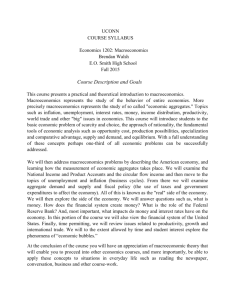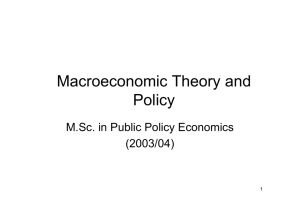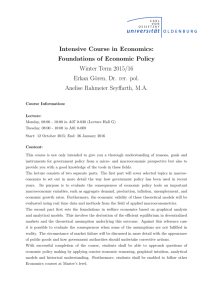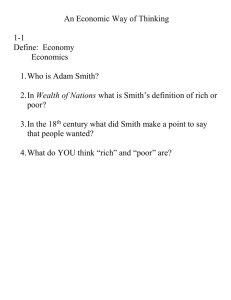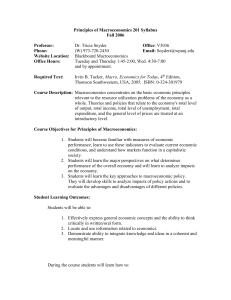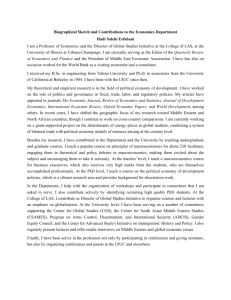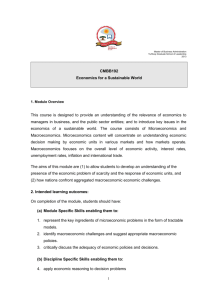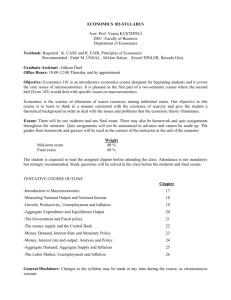ECONOMICS 101
advertisement
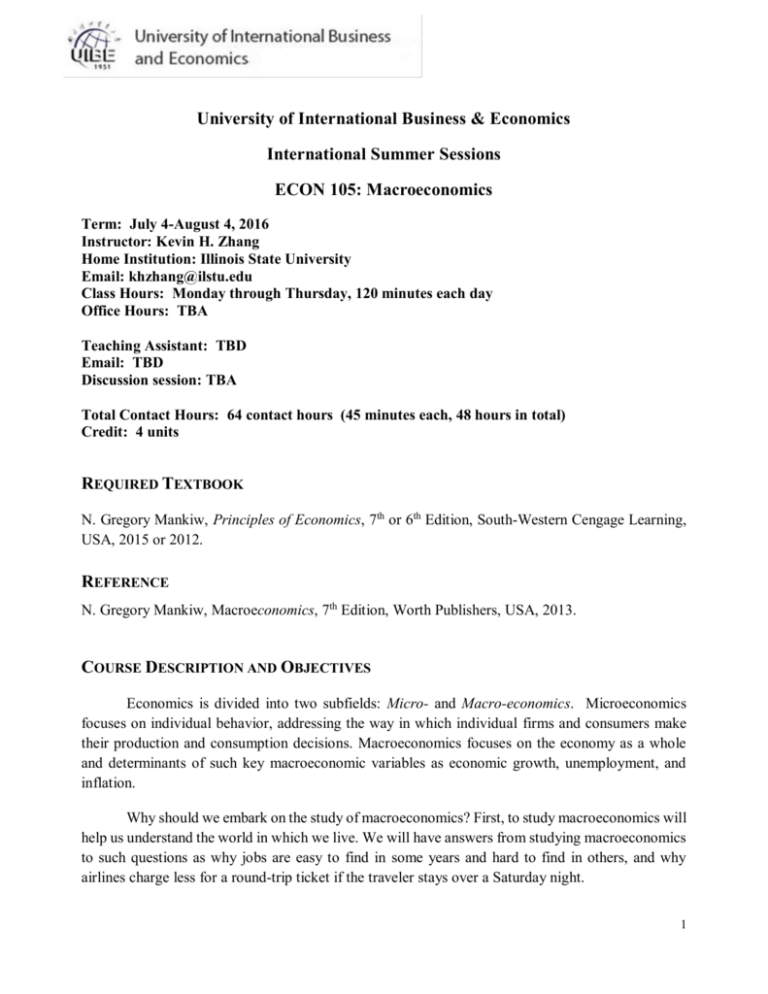
University of International Business & Economics International Summer Sessions ECON 105: Macroeconomics Term: July 4-August 4, 2016 Instructor: Kevin H. Zhang Home Institution: Illinois State University Email: khzhang@ilstu.edu Class Hours: Monday through Thursday, 120 minutes each day Office Hours: TBA Teaching Assistant: TBD Email: TBD Discussion session: TBA Total Contact Hours: 64 contact hours (45 minutes each, 48 hours in total) Credit: 4 units REQUIRED TEXTBOOK N. Gregory Mankiw, Principles of Economics, 7th or 6th Edition, South-Western Cengage Learning, USA, 2015 or 2012. REFERENCE N. Gregory Mankiw, Macroeconomics, 7th Edition, Worth Publishers, USA, 2013. COURSE DESCRIPTION AND OBJECTIVES Economics is divided into two subfields: Micro- and Macro-economics. Microeconomics focuses on individual behavior, addressing the way in which individual firms and consumers make their production and consumption decisions. Macroeconomics focuses on the economy as a whole and determinants of such key macroeconomic variables as economic growth, unemployment, and inflation. Why should we embark on the study of macroeconomics? First, to study macroeconomics will help us understand the world in which we live. We will have answers from studying macroeconomics to such questions as why jobs are easy to find in some years and hard to find in others, and why airlines charge less for a round-trip ticket if the traveler stays over a Saturday night. 1 Second, to study macroeconomics will make us become more astute in going about our life with many macroeconomic decisions. While studying macroeconomics will not by itself make us rich, it will give us some tools that may help in that endeavor. Third, macroeconomics will teach us how to assess and choose a better economic policy, whether we are voters or decision-makers. When you have completed this course, you should be able to do following: Apply basic macroeconomic concepts to your daily life as well as specific situations; Identify basic macroeconomic concepts used in daily newspapers, magazines, and TV programs; Interpret economic data, e.g., data on prices and quantities of specific goods and services, GDP, unemployment, and inflation; Critically evaluate the claims of politicians and other policymakers regarding the welfare effects of their proposals. TEACHING APPROACH OF THE COURSE Stress the basic principles of economics Avoid nonessential material Explain difficult concepts patiently Use concrete examples COURSE GRADES Your grades are based on a total of 300 points, which are acquired as follows: 2 Exams 2 Homework Sets = 200 points total, 100 points for each = 100 points total, 50 points for each Total = 300 Grades are based completely on the work listed above. NO extra credit work is given under any circumstances. The scale for semester grades is as follows: Score 90-100 85-89 82-84 78-81 75-77 72-74 68-71 64-67 60-63 Grade A AB+ B BC+ C CD GPA (0-4.0) 4.0 3.7 3.3 3.0 2.7 2.3 2.0 1.5 1.0 2 ≤60 F 0.0 Exams: Two exams are non-comprehensive and each exam consists of 50 multiple-choice questions. Please note that NO MAKE-UP EXAMS WILL BE GIVEN. Homework: Two homework sets are distributed during the course in order to give you practice working with the concepts introduced in the class and also to prepare you for the exams. Homework serves as a sample exam in the sense that their questions are similar to those of exams in topics, difficulty degree, and number of questions. The failure to try all questions is viewed as an indication of lack of effort, besides costing you the points you could have earned on the homework. ATTENDANCE Summer school is very intense and to be successful, students need to attend every class. Occasionally, due to illness or other unavoidable circumstance, a student may need to miss a class. UIBE policy requires a medical certificate to be excused. Any unexcused absence may affect the student's grade. Moreover, UIBE policy is that a student who has more than 1/3 (6 times) of the class in unexcused absences will fail the course. GRADING POLICIES (1) If you miss an exam without an excused absence, you will receive a zero on it. No make-up exams are given. (3) If an illness or some emergency prevents you from attending class, or taking one of exams, please try to discuss this with me before the class and the exam. Documentation (notification from doctor, for instance) may be required. If you don’t contact me until after the exam, documentation will be required. If you are excused from one exam, then other exam will be worth 200 points (rather than 100 points) for each. Similar policy applies for homework. You also will not lose 4 points for attendance if you contact me before the class. (4) Late homework will not be accepted because the answer key is distributed on the due day. (5) Anyone caught cheating on any exam or quiz will receive an “F” in the class and will have their case referred to the Student Judicial Office for additional disciplinary action. HELP My regular office hours are indicated on the front page, and please make use of them. I strongly urge you to make an appointment to see me should you be encountering difficulties but not able to come at the regular office hours. I maintain an open door policy and look forward to meeting 3 with you on a one-on-one basis to discuss any questions you might have. Please, do not hesitate to come and see me whenever you need additional help. I also take advantage of email system to seek for more convenient connections with you. Please write me through email for any kind of questions. STUDYING MACROECONOMICS Many studentsperceive economics as being a very difficult, if not impossible, course to master. However, this perception is, in all likelihood, based on observations of the experiences of other students who did not apply the proper approach to learning economics. In many courses, simple memorization is enough. This is not the case in economics. In this course you will need to understand the meaning of basic terms and concepts, but you will also be required to demonstrate the ability to apply economic concepts in specific situations. In other words, you will be required to demonstrate the ability to think like an economist! As you proceed through the course keep in mind that you learn economics by doing economics. That is why the collaborative exercises, study guide, quizzes, homework, and essay questions are so important. They contain a wide variety of problems that require you to apply what you have learned and, at the same time, to test your understanding of the materials. I recommend the following approach to studying and learning economics. Read over the material we will be covering in class before each session. The idea is not to master the material being covered but simply to familiarize you with the concepts to be covered in class. In addition, start working on the questions in the study guide that your group will be working on during the next class session. Attend each class, take good notes, and assume an active role within your group. After class, read the text again, study your notes and continue working in the study guide. Form a study group that meets outside of class on a regular basis to go over the material, work on homework, and go over problems in the study guides. See me if you feel lost. Don’t wait as thing will only get worse! You (and the taxpayers of Illinois) are paying me to teach this course, so take advantage of my services. If you can’t make office hours, see me after class or call/email me, and we will set up a mutually convenient time. 4 Course Outline 1. Part I: 2. 3. Part II: 4. 5. The Science of Macroeconomics Introduction Measuring a Nation’s Income Measuring the Cost of Living Growth Theory and Policy: The Economy in the Very Long Run Economic Growth I: Theory of Productivity Economic Growth II: Policies of Growth Part III: Classical Theory: The Economy in the Long Run 6. 7. 8. 9. Saving, Investment, and Financial System The Monetary System Inflation: Its Causes, Effects, and Social Costs Unemployment Part IV: Macroeconomics of Open Economies 10. Open-Economy Macroeconomics: Basic Concepts 11. A Macroeconomic Theory of the Open Economy Part V: Business Cycle Theory and Policy: The Economy in the Short Run 12. Aggregate Demand (AD) and Aggregate Supply (AS) 13. Influences of Monetary and Fiscal Policy on AD 14. The Short-run Tradeoff between Inflation and Unemployment Part VI: Final Thoughts 15. Six Debates over Macroeconomic Policy 5

